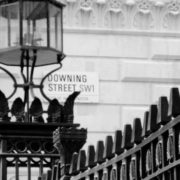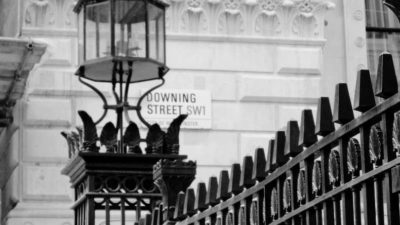First her policies went up in flames, then her brief career as Prime Minister.
The great political gamble of Liz Truss has spectacularly backfired but not before wreaking significant damage to the UK economy.
It will take considerable time before the risk premium attached to UK assets fades away, following the financial nervous breakdown which followed the mini-budget.
With a political implosion seemingly imminent, and expectations rising that Liz Truss’ minutes in power were numbered, the pound crept up in value, heading back towards $1.13.
As she gave her resignation statement, it largely held onto gains.
Sterling is highly sensitive to economic policy uncertainty and even though the ship Britannia will still be left largely rudderless, with a successor still to be chosen, as far as investors are concerned, the future is marginally brighter without her in charge.
Ten-year gilt yields eased further today, as speculation soared about her resignation, a sign of tacit approval from the bond vigilantes who punished the UK by deserting its government’s debt as worries raced up about fiscal responsibility.
However, on the equity markets, news of Truss quitting was met with another bout of nervousness, as political uncertainty conspired with worries about the impact of recession.
With the third Prime Minister in just a year expected to be announced by the end of the month, the UK will still be viewed in financial markets as politically unstable.
What investors crave is more steadiness and reliability but until they know who will take charge and lead an economic recovery, that stability still remains highly elusive which means that neither sterling nor stocks are likely to make any big strides of progress.
Giles Coghlan, Chief Market Analyst, HYCM, comments:
“After just 44 days in office, it appears that the markets and a party in open revolt have sealed Liz Truss’s fate.
Although Truss was brought into usher in an era of growth and ‘trickle-down economics’, her strong pro-growth policy was poorly timed, sending the UK bond markets into a sharp sell off as her policies fanned the flames of surging inflaton.
To fend off instability, the Bank of England has even intervened in gilt markets, and it remains to be seen whether the central bank will now hike interest rates more quickly.
With all that in mind, Truss’s departure is likely to be mildly GBP positive, depending on her successor for the premiership.
Already, the UK gilt market was supported as rumours of the prime minister’s resignation came to light this morning, which is a good sign for the pound’s stability.”
Commenting on Truss resigning and Sterling’s game of snakes and ladders being far from over, William Marsters, Senior UK Sales Trader at Saxo, said:
“The pound has spiked following the Prime Minister’s resignation speech as the market can take some temporary confidence that there will be no more outlandish Truss-like economic policies.
Liz Truss stepping down signals an end of a catastrophic few weeks with the economy being beaten down by the now former PM’s ‘growth plan’.
Though many will be glad to see the back of Trussenomics, the announcement of a Tory leadership contest next week leads to more uncertainty on who could be next in No.10.
Sterling’s game of snakes and ladders is far from over, yet it’s unlikely GBP will show many signs of long-term recovery.
The economy is likely to continue to suffer at the hands of rising inflation, which has led to crippling everyday costs affecting households and businesses up and down the UK, reiterated by yesterday’s stubbornly high CPI announcement.”
Ryan Jones, partner in rating at Cluttons comments:
“Business rates need to be looked at again and in depth. Over the past three years, businesses have faced many challenges from Brexit to Covid, the acceleration of online retail and latterly the energy and talent crisis the latter two causing many retail and hospitality businesses in particular to close part-time in a bid to save on costs or because they cannot operate.
Many other businesses have adapted and sought to be innovative to cope with these changes.
Now is the time to help them flourish and enjoy a prolonged period of operation during a time when the British public are embracing physical retail and getting to grips with the return to the office.
We believe smaller businesses should take priority, but we must also not forget the pension funds and public sector bodies that also own and occupy real estate and who have a duty to ensure finances are protected to support real people in the long term.
In the meantime, we continue to urge businesses to act now ahead of the next revaluation of 1 April 2023 by checking their rateable values now, before their opportunity is lost and well ahead of the 31 March 2023 deadline.
This may provide backdated payments on the last six years for their properties that have potentially been overvalued.
We are offering free rates audits to all businesses in order to help this get kickstarted.”
Darren Zitren, head of network estate management at Cluttons comments:
“The UK cannot afford to abandon levelling up, no matter what it is called or how it is presented.
Connectivity is key to levelling up the UK because this fuels economic growth, investment from businesses, talent, jobs, and access to social benefits and healthcare amongst many other things, including access to energy infrastructure which is going to be ever more crucial going forward.
Hence, we hope that the rollout of superfast broadband and 5G infrastructure gets a higher pegging on the list of Levelling Up priorities than the previous administration’s watering down of targets.
We are mindful that the Government have focussed most attention on energy bills and the cost of living in this emergency business response and mini budget and, whilst this is understandable, the foot cannot be taken off the gas of measures that will accelerate growth and support economic recovery to the whole of the UK in the months and years ahead.”
Joshua Raymond, Director at online investment platform XTB.com comments:
“We’ve seen the pound rally against the US dollar and euro on the back of the Truss resignation news, with the GBP rising around 1%.
We’ve also seen long dated UK gilt yields also fall, with the benchmark 10yr yield falling around 0.2% to around 3.8%.
That in itself is a strong message.
Normally markets hate market uncertainty and the removal of a sitting Prime Minister would be taken negatively.
The fact its been seen as positive tells you all you need to know about the market’s attitude towards the Truss premiership.
The markets have now seen off a complete change in leadership of both No 10 and the UK treasury in just a matter of days.
That is remarkable.
Investor eyes now switch firmly to who takes over as the new PM and the fact it will only take a week is helpful to remove longer term uncertainty.
The focus now shifts on who takes over.”





















Comments